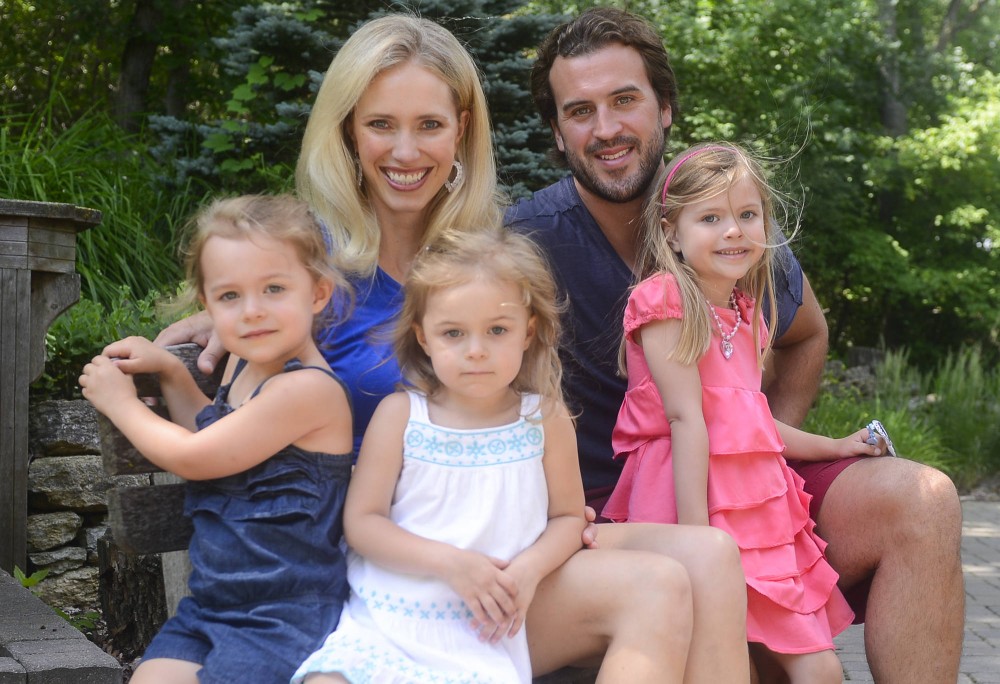Chatter echoed throughout Ben Utecht’s home just miles south of the Twin Cities on Monday morning as his daughters got dressed and ready for the day.
“I want the pink polka dot glasses,” Elleora, the oldest at 5 years old, called out while descending the suburban home’s staircase into the living room. Wearing a pink dress and accessories to match, she gave her father a hug.
“You’re beautiful,” said Utecht, 33, a former NFL and University of Minnesota tight end.
Utecht’s wife, Karyn, wasn’t far behind, toting 3-year-old twins Katriel and Amy. He met his wife while starring on Minnesota’s football team more than a decade ago.
“They’re all daddy’s girls,” Utecht said.
But amid Utecht’s pride in his family rests a strong sense of fear. After suffering from multiple concussions on the field, he could soon lose the ability to remember the names or faces of his girls.
After being named first-team All-Big Ten during his senior season, Utecht played in the NFL for the Indianapolis Colts and Cincinnati Bengals and won a Super Bowl during his four-year career.
Utecht’s career ended in 2009 after his fifth documented concussion left him limp on the practice field, strapped to a board and carried off in an ambulance.
Since then, Utecht has combined two of his greatest passions — family and singing. He’s gaining national attention with the release of a new video that documents his love for his family. He wrote the song in case his head injuries worsen.
Losing recollection
While Utecht’s playing career is over, reminders of his time on the field are everywhere.
A bookshelf in the family’s living room displays a Gophers football plaque, which neighbors a small trophy from the Colts’ 2007 Super Bowl victory.
A grand piano that Utecht played in his rising YouTube music video titled “You Will Always Be My Girls” sits a few feet away. The original song has had nearly 400,000 views since its upload less than two weeks ago.
Utecht said he often can remember the lyrics to songs seamlessly but on occasion has to reference a copy of the music because of “gaps” in his memory.
He said he never wanted to cope with the idea of losing memories, but after a rude awakening at a good friend’s house, he reconsidered. Sitting at a table with his longtime friend and friend’s wife, Utecht asked why he wasn’t invited to their wedding.
They responded to his question with disbelief and showed him a photo album from the wedding where Utecht sang and was a groomsman.
“To this day, I don’t have any recollection of that whatsoever,” Utecht said.
Once he realized his memory issues were real, Utecht’s musical partner, Rick Barron, pushed him to write a love letter to his wife and daughters in case his memory got worse.
Utecht typed the letter into his iPad while riding on a plane, pulling the brim of his baseball cap over his face to hide tears.
“Writing that letter was such an important part of the story,” Utecht said. “What could happen to me not too far down the road because of multiple concussions?”
Putting up with pain
Sometimes Karyn Utecht has to ask her husband if he’s all right. Similar to forgetting lyrics to songs, Ben Utecht occasionally has trouble finishing sentences.
“It’s a difficulty retrieving the word,” Karyn said.
Though some short-term problems persist and long-term issues — like forgetting his friend’s wedding — arise, Utecht still remembers his first documented concussion in vivid detail.
In a third-week game at Baylor during the 2000 season, Utecht collided with an offensive lineman, knocking him unconscious.
Utecht came off the field with blood dripping from his nose, and he sat out the rest of the game.
Utecht, playing at a time when concussion protocols for football weren’t as stringent as they are today, may have returned to football too soon.
“I was back on the practice field two days later,” he said.
Now, players have to go through rigorous tests after coming back onto the field. Still, unrelenting headaches from blows to the head are common.
After starting nine games last season at right guard for Minnesota, Caleb Bak announced in May that he was not returning to play football for his senior year. He suffered a concussion against Nebraska in October and said he still has splitting headaches every day.
Daily head pain is normal for almost every offensive lineman, Bak said.
“It’s something we just put up with,” he said.
Jürgen Konczak, a professor of biomechanics and neuromotor control in the University of Minnesota’s School of Kinesiology, said the best way to treat head injuries is with rest.
Konczak also noted it’s very common for football players who have had multiple head injuries, like Utecht, to experience memory loss.
“There’s a whole range of psychological abnormalities you may see,” Konczak said.
Moving forward
Utecht used to spend his weekends driving down the field catching passes from Peyton Manning.
Now, it’s common for him to take trips to Rochester, Minn., to visit his neurologist at the Mayo Clinic.
Utecht connected with the specialist through the American Academy of Neurology, for which he’s now the national spokesperson.
“[Utecht] really is, I think, a trailblazer as far as building awareness,” said Catherine Rydell, the American Academy of Neurology’s executive director and chief executive officer. “[He’s] helping the public understand how serious this is.”
Utecht said he thinks the answer to fixing football’s head injury epidemic is by raising funds for
research. He’s not only hopeful that neurologists will find a way to improve treatment, but he also believes in the brain’s natural ability to adapt.
“The brain is a remarkable organ, and it finds ways to heal and finds ways to grow,” he said.
But if Utecht’s worst fears do eventually come true and he forgets his wife and daughters, they can grab a computer and watch him sing: “You will always be my girls. You’re the beauty of my world.”


